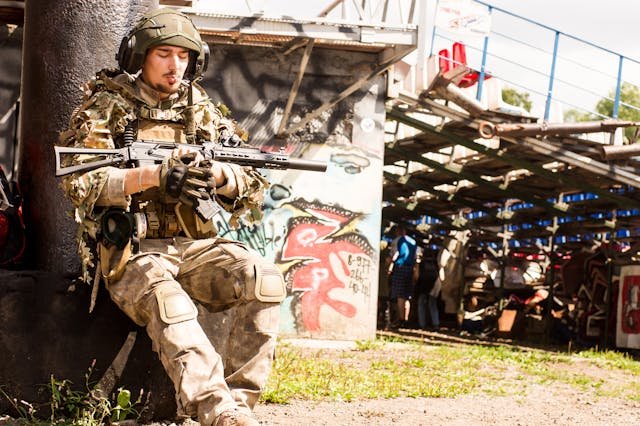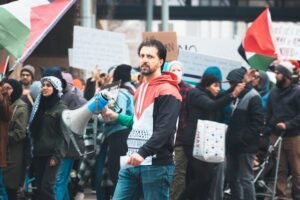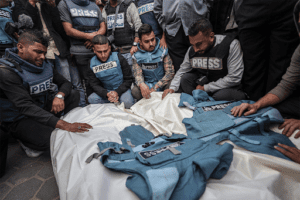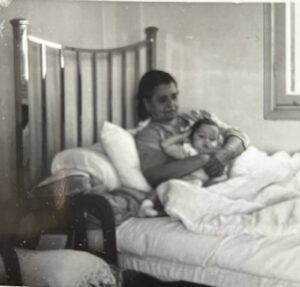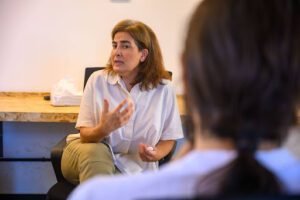Hundreds of articles were written about the Palestinian poet Mahmoud Darwish (1941-2008), all tried to affirm the exceptional features of his creative career, framing his work as a representative of the cause of Palestine, and the Palestinian people of liberating their country from occupation.
This narrative dominated too much reducing his talent, tried in vain to restrict his role only to a political one. The tough,t however, is that Darwish gave his poetry an excessive dimension crossing the borders from geography to history.
Those who read poetry have a full-time record of poets carrying the expression banner defending their national causes. This poetry meanwhile included a deeper touch of humanity. Therefore, the readers of Federico García Lorca, Paul Eluard’s poems, Bertolt Brecht, or Pablo Neruda’s Poems, feel grateful to the poetry rich of humanity solitude enhancing the beauty values considered the prioritised standard judging literature.
During his long career that exceeded half a century, Mahmoud Darwish tried to extend his poetry to a deeper human sphere than that of his daily political commitment.
His poem “Think of Others” which he crafted late nineties highlighted this factor:
“When you prepare your breakfast, think of others
Dont forget the pigeons’ food
When you are at war, think of others
Don’t forget those who seek peace
When you pay your water bill, think of others
Those who feed on clouds
When you are back home, your home, think of others
Dont forget the refugees in tents
When you count the starts while sleeping, think of others
Those who cannot find a space to sleep
When you set yourself free with imagination, think of others
Those who lost their right of speech
When you think of distant others, think of yourself
Tell yourself; I wish I was a candle in the dark
Web developer: Link to the poem in Arabic
https://soundcloud.com/insanimagazine/iby0xa1jeulm
Darwish in another question
This little poem expresses meanings that can be found in international legal conventions related to human rights and appears to be an answer to the questions that surround us in today’s world.
It is noteworthy that critical readings and press comments were written about this poem recently, linking it to what is happening around us in different parts of the world, including, for example, a reading by the Kuwaiti writer Abdul Aziz Al-Kandari. Inspired by Darwish he writes:
“Think of others… those who are escaping from explosive barrels as they plew through plow the sea in rickety boats in search of the shores of life. The result is the death of dozens, then the news goes unnoticed in the news broadcasts as if the human soul has become worthless, and the majority of those escaping in death boats are pushed to that. Poverty, identity killing, and the brutal sectarian wars that the Arab region has experienced, and what exactly is happening in the Arab world?”
Such a reading puts Darwish’s poetry on another test, as it comes years after his death, and places his poetry at the heart of questions of the current reality, especially those related to the conditions of refugees and problems of integration.

Mahmoud Darwish’s grave. Copyrights public use
The minimum homeland
Likewise, German Melanie Christina Moore has a similar look at his poem “A Seat on a Train.” In the poem, Mahmoud Darwish strikingly describes the feelings of people on their way to an unknown future, often on strangers’ trains, and describes every train station as another place of refuge. Enhances the refugee’s feeling of fear of the unknown.
The poet says: “All the people on the train return to their families, but we do not return to any home.”
Christina Moore believes that these poetic texts written by Darwish were derived from his life experience, which was “colored by asylum and exile, and dominated by the theme of the Palestinian tragedy until he died in 2008.”
Darwish says: “We travel in search of zero,” and thus he succeeded in defining the nature of asylum. The refugee carries in his jacket pockets the bare minimum of his homeland, often the key to the old house and a family photo.
In the “Jarrah House” tragedy that erupted months ago in Gaza, we saw dozens of media reports showing Palestinians from the older generations holding the keys to their fathers’ homes and never losing hope of recovering them after the occupation was removed.
Such people renewed Mahmoud Darwish’s confidence in inventing hope, and as the critic of the Israeli newspaper “Haaretz” confirmed after his death, Darwish lived his life clinging to hope, and his vision was based on the idea that if there is no hope, then we must invent it.
In an interview with critic Charbel Dagher, Darwish says: “The power of hope does not always come from the power of expressing an optimistic end to a human massacre, because the power of sadness and even the power of despair if expressed creatively, creates hope, which is the hope of the human ability to create.”*
The poet says in his poem “State of Siege”:
here,
On the slopes of the hills,
Before the sunset and the mouth of time,
Near orchards with no shade,
We do what prisoners do,
What the unemployed do:
We raise hope.
With clear determination: “I will travel this long road, this long road, to the end. …The earth is narrow for us or not. “We will come this long way.”
Perhaps the meaning of hope is one of the most abundant meanings in the late poet’s texts. Through it, he wanted to create a “common identity” that confronts the tragedy of the occupation.
The wound turns into a rose. Although Darwish repeatedly emphasized his desire to liberate his poem from its documentary character, in return, he succeeded in developing the view on the concept of political commitment and making it a companion to human commitment, and his poetry reflects the path of this development with striking clarity, which was linked to the poet’s growing expertise and experiences. His beginnings were inside the occupied Palestinian territories. He wrote texts that made his poetry a carrier of the issue of the “people of tents,” which is a clear indication of the entrenchment of the idea of “homelessness and asylum.”
His famous poem “Record, I am an Arab” gives the most prominent example of his adherence to his Arab identity, and with the experiences of travelling and living between Moscow, Cairo, Beirut, then Tunisia, Paris, and Ramallah, Darwish exceeded the limits of his responsibility to embrace the Palestinian cause, and express that poetically, because his poetry derived new sources, and Also in multiple tributaries.
In the 1980s, he wrote an article in which he showed an exceptional awareness of the importance of freeing the text from the pressure of the moment. He said: “What threatens the growth of our literary writing is the daily aspect of the political because we are constantly exposed to a project of extermination that mobilizes all self-defence energies in confronting it, which undermines literary prowess.” In moral embarrassment, it is as if you ask: What humanity emerges from this aesthetic?
He adds: “If one of the characteristics of literature is that it is a workshop for creating aesthetics, then how long will the humanist in us be satisfied with this paradox that turns a wound into a rose? Has life accustomed us to prioritizing effectiveness over aesthetics? But literature presents its effectiveness insofar as it is literature, with effectiveness, not insofar as it is effectiveness.
In his final stage, Darwish’s poetry was freed from direct political meaning, and he went towards hunting for small details. He worked to formulate a humane concept of Palestinian identity, starting from the experiences of the places, ahead of the definitions that made the Palestinians dependent on his cause alone, or on descriptions of asylum only.
In another article published by the poet in the early seventies during his stay in Egypt under the title: “Poetry Announces Its Presence” (June 30, 1972), we early glimpse the roots of the belief in the freedom of poetry from the task of direct expression and the rejection of the idea of protest.
The Palestinian storyteller Mazen Marouf traces the development of Mahmoud Darwish’s poems, tracking the profound transformations in the poet’s awareness of the concept of commitment. His poems went beyond the mission of preaching Palestinian resistance, even though they included a direct form of poetic speech, one of the types of poetic political discourses, and an ideology that reflects a deep leftism. The poet was a son of the Israeli communist “Rakah” party, but on the other hand, he emphasized his treatment of all forms of alienation.
Marouf says: “Had it not been for the reader’s knowledge of Mahmoud Darwish’s identity as a Palestinian, he would not have had major or direct characteristics indicating that he had a dominant political or Palestinian source, except in the poem “Record, I am an Arab.” It took a general human form and was associated with the pain of the lover or the stranger, as it was embodied in different aspects, all of which maneuvered to reach the final station: the Palestinian pushed out, if not expelled. It is an estrangement in identity, and an emotion within the predicament of belonging, just as it is an emotional estrangement, the loss of a beloved, and it contains, of course, an evocation of the climate and environment of this love, that is, the place and circumstances that form memory.”
Arab pens presented Mahmoud Darwish as a romantic poet but with double pain. He is torn between love and country, presence and alienation, memory and the present, and forgetting and stretching out in an imagined place. But despite this heaviness, his tone remained lyrical, Marouf says.
Humanizing the Enemy At another stage, Darwish ventured to present a different image of the enemy, specifically the perpetrator of this hostility, i.e. the Israeli soldier. In “A Soldier Dreaming of White Lilies,” the poet dialogues with a soldier who is tired of war.
The poem begins with a question about the meaning of homeland: “He dreams of white lilies/ of an olive branch/ with its leafy bosom in the evening/ he dreams, he told me, of a bird/ of a lemon blossom/ and his dream did not philosophize… he did not understand things/ except as he felt them.. he smelled them/ he understood, he told me, Homeland/to drink my mother’s coffee/to return in the evening/I asked him: And the earth?/He said: I don’t know it/And I don’t feel that it is my skin and my pulse.”
Marouf says: “Darwish set aside the revolutionary component of his poem, to rely on a non-high-profile reading of Palestinian reality, this time from the eyes of an Israeli soldier.” A sharp transition from the human-victim formula to the human-soldier formula was not attributed to the specificity of Palestine. Rather, Darwish chose to extend the meaning of homeland in human terms devoid of the geography of the place, its moral significance, and its special religious symbolism. This leads to the intertwining of the features that make up the concept of victimhood with each other.”
Mazen Marouf sees that the soldier, like the victim, dreams, wants white lilies, and has no need for weak people to kill. Thus, the poet reduced the idea of homeland to the limits of individual, non-ideological understanding, “and he did not philosophize his dream. He only understood things as he felt them.”
The human being comes into the poem as a non-supernatural dervish. His speech is born of fatigue and falls into simplicity. He is a person who has reneged on his job, that is, on the conditions that established the state of the Palestinian-Israeli conflict, and on brutality. He needs a corner to take refuge in, and the refuge here is not political, but emotional as well.
Whoever returns to Darwish’s articles, which he published in Al-Ahram newspaper during his short stay in Egypt between the years 1971-1972, can infer that there was an early keenness on the part of the poet to “humanize the enemy,” more than to “demonize” him.
By emphasizing the humanitarian predicament of this enemy, it is possible to rely on a moral position that enhances the meaning of resistance as a condition for human liberation. This vision was extended to include the collection “State of Siege,” which he wrote following the siege that Palestinian President Yasser Arafat was subjected to in Ramallah in 2003.
The poet says:
“To a murderer: If you look at the victim’s face
And I thought you remembered your mother in the room
Gas, you are freed from the wisdom of the gun
And you changed your mind: This is not how identity is restored!
A feeling of distress
There is an article written by the poet entitled: “You and I and the Coming War,” highlighting the fears of an Israeli writing a letter to his girlfriend. In a novel by the Israeli writer, Ehud Ben Ezer, Darwish points out in his important article the indications of the emergence of a trend that he called “anxiety in Israeli literature,” which is the result of a feeling of distress and fear of the ongoing war, without always directing the accusation to its correct address.”
Darwish also saw this meaning in a poem he wrote “A State of Siege,” which says:
“This siege will extend until…
The besieged feels, like the besieged,
That boredom
A human characteristic »
The poet talks to himself
Critics of Mahmoud Darwish’s poetry note that the poet, throughout his career, sought two clear issues. The first is that he worked to reproduce the place poetically and deal with its parts and details as an intimate dimension of the self. The place was also used in his poems as an actor in changing the human personality. As for the second issue: It came from his advanced understanding of the meaning of identity.
The poem “Tabaq,” which he dedicated to his friend, the prominent Palestinian academic Edward Said, gives the poet’s interlocutor multiple images of his identity, and he triumphed over its pluralism due to the paradoxes of exile that grant “identities instead of one identity.” He praises Edward Said because he remained loyal to his voice as a victim resisting settler colonialism.
The novelist, Liana Badr, says: “Tabaq’s poem suggests that the poet is in dialogue with himself”:
“Identity, I said / and he said: self-defence/identity is the result of birth, but in the end, it is the creativity of its owner, not / inheritance of a past, the multiple me. In / my renewed internal and external… but / I belong to the victim’s question.”
Despite the fame that he achieved, Darwish continued to respond to a deep pain that he did not stop digging deep into, which was the pain of exile. He emphasized in his poetry an open concept of Arabism, not as an identity closed on itself, but rather a concept that is viewed through language as a tool for this pluralism. Therefore, he continued to dialogue in his poetry with multiple identities and a diverse human heritage.**
Footnotes
⃰⃰ See the dialogue in Mahmoud Darwish’s book Remembers in My Papers, Sultan Al Owais Foundation, Dubai 2019, p. 330.
**Jean-Michel Mulbroy, As-Safir, August 14, 2008.
First published in Al-Insani ICRC Spring 2021.

